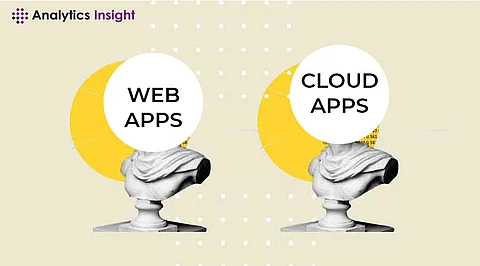

Web apps and cloud apps are two business operational models that organizations must select based on their business operations in the fast-growing technological realm. Web apps can be run on the Internet using web browsers and are famous for their simplicity and efficiency.
While web apps and cloud apps both have their pros and cons as far as access, confidentiality as well and maintenance contrasting these two can’t be avoided by anyone who is committed to building efficient technology plans that will enable them to meet their objectives through the provision of industrious and dependable business software; cloud apps use cloud computing technology making them scaleable. Let’s have a brief discussion about web apps vs. cloud apps.
These web-based apps depend on web servers and are planned to be utilized on web browsers only. On most occasions, they come with basic architecture and offer restricted customization. Web apps are known to combine client-side scripting and server-side scripting, in which case the client will depend on the Web server for surveying the administrations. E-commerce applications and e-banking are a few illustrations of these sorts of apps.
Web apps are partitioned into five bunches: dynamic, static, portal, animated and content administration frameworks, and e-commerce. The most fundamental is the static web apps, which are so-called since their content remains the same over time.
It is very basic to maintain web apps since they utilize a common code base across several platforms.
It is conceivable to make web apps for all stages so long as they can run in a web browser.
Unlike other app sorts, web apps are more reasonable upfront.
It is not basic for the overhauls of these apps to go through an app store. This infers that there is no requirement for clients to oversee the apps physically. Once a web app is opened by a client, the later form will continuously load.
The scope of web apps is much less in terms of leveraging equipment and gadget features.
A web app cannot be run without a browser, so the client must take additional steps to utilize it.
Users will collaborate with different web browsers, and the execution measurements and utilization designs used to create a product guide are more challenging in terms of collection.
As compared to other app sorts, web apps are much less responsive and slower.
Unlike local apps, web apps are less natural and less interactive.
With web apps, the number of branding openings is much less.
Email service will be a legitimate illustration of a cloud app in which clients are associated with the application utilizing a web browser or a versatile gadget. The app’s information will be prepared by the local gadget and cloud computing solution, suggesting that it is conceivable to access it online and offline.
On most occasions, cloud applications will be composed of one of three categories: SaaS (Software as a Service), IaaS (Infrastructure as a Service), or PaaS (Platform as a Service). SaaS happens to be the most ordinary of these three, where a third-party cloud supplier oversees and facilitates the whole app.
Cloud apps permit individuals to share data effectively and rapidly, utilizing shared storage, and in this way, they help improve collaboration.
Cloud empowers us to effortlessly access store info rapidly anytime, anyplace by utilizing a Web connection.
An organization's proficiency is expanded by a web cloud framework by making certain that information is open at all times.
The cloud advertises tremendous storage capacity for storing vital information like documents, audio, graphics, and video in a single place.
One major advantage of cloud-based apps is data security. The cloud helps ensure that data is stored and handled safely.
One of the greatest disadvantages of cloud apps is that companies might confront issues while exchanging their administrations between vendors.
Cloud clients do not have much control over the usefulness and execution of administrations within a cloud infrastructure.
Even though cloud services advertise top-notch security for storing fundamental information, it is critical to recognize that you’re sending all your company's delicate information to a third party before embracing cloud technology.
Clients access data from the cloud using a Web association. They can’t access information if the Web connection is not up to the check. Unfortunately, this is the only way to access data from the cloud.
